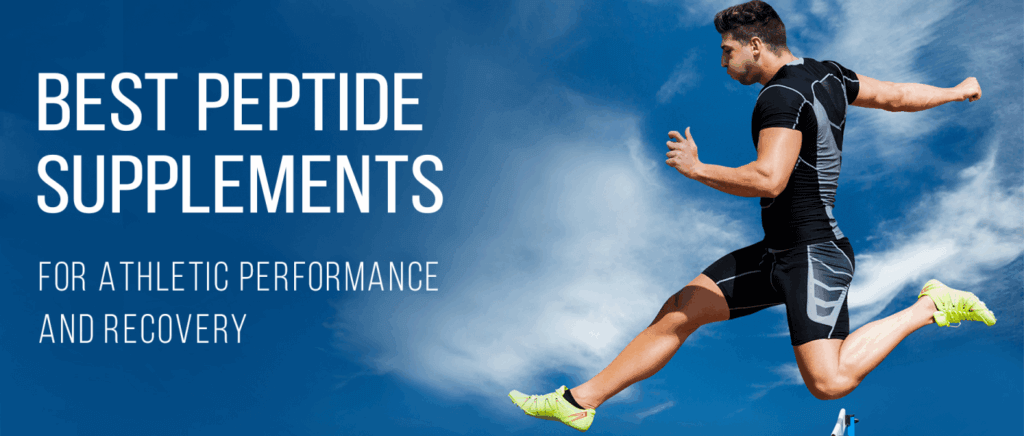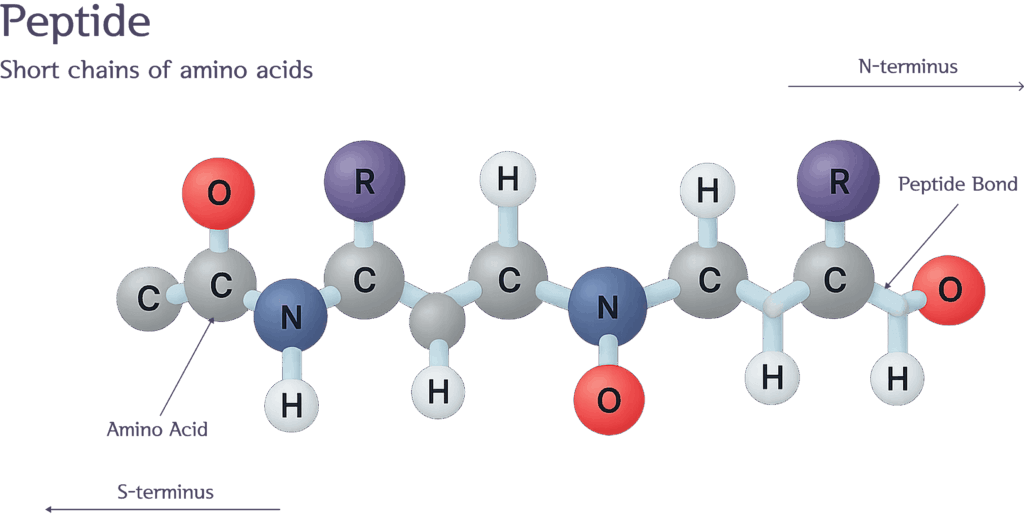
For as long as recorded history, competitive sports have played a key role in human culture, providing us with inspiration and entertainment as we watch our favorite athletes vying for a Win. But peak athletic performance comes with a price – the world’s top athletes stay in peak condition by carefully selecting and monitoring their training regimens and nutrition, and by utilizing post-exercise recovery and sleep optimization strategies that make their tissues resistant to injury.
To achieve peak performance and accelerate recovery, peptide supplements are gaining traction with elite athletes who want to gain a competitive edge. Learn how peptide therapy can help boost athletic performance and speed recovery.
The Role of Peptides in Physical Performance.
Peptides are short chains of amino acids that act as signaling molecules in the body. They influence multiple biological processes such as hormone release, tissue repair, and inflammation reduction. Your body makes peptides from dietary proteins, but many athletes find it challenging to eat enough daily protein to meet the demands of training and performance. Peptide supplements can help bridge the gap.

For athletes, peptides offer targeted support for performance factors such as muscle growth and repair, collagen production, and reinforcement of connective tissues, including tendons, ligaments and fascia. According to recent research, peptides can help to boost performance, accelerate recovery from exercise, promote injury healing, and reduce sports injury risk.
One 2024 systematic review and meta-analysis looked at 19 studies comprising 768 participants to see whether collagen peptides were beneficial for improving personal health, enhancing athletic performance, and preventing injuries.
Researchers found that:
- Long-term intake of collagen peptides in conjunction with resistance training offered advantages in terms of improved fat-free mass, maximal strength, tendon morphology, and reactive strength recovery.
- Collagen peptides enhance the tendinous cross-sectional area, providing protection against sports-related tendon injuries.
- A daily intake of 15 g of collagen peptides over at least 8 weeks appears to be beneficial for sports performance and recovery.
Another 2024 study of 286 participants divided the subjects into two groups: the treatment group received collagen peptides while the control group received a placebo. Their findings supported the hypothesis that collagen peptides have the potential to mitigate muscle stress from acute strenuous resistance training.
As peptides gain popularity among athletes and fitness enthusiasts, the body of research is growing rapidly, providing evidence of their benefits. Even medical researchers are looking at the benefits of peptides for optimizing patient health.
Top Peptides for Athletic Performance and Recovery
Here are some of the most evidence-based peptides for athletes and physically active people:
BPC-157
- Accelerates tissue repair in muscles, tendons, and ligaments
- Reduces inflammation
- Promotes injury recovery and gut healing
- Reduces post-exercise joint and muscle pain
- Promotes endurance
- Relieves tendonitis
- Often called the “Wolverine peptide” for its regenerative effects
TB-500 (Thymosin Beta-4)
- Enhances muscle endurance
- Promotes flexibility
- Aids in connective tissue repair
- Improves blood flow
- Reduces scar tissue formation
- Speeds post-exercise recovery
- Stacks well with BPC-157 for synergy
Ipamorelin
- Stimulates release of natural growth hormone (GH)
- Supports lean muscle growth
- Encourages fat metabolism
- Promotes better sleep for enhanced recovery
- Has anti-aging properties
CJC-1295
- Prolongs elevation of GH and IGF-1 for sustained muscle repair
- Improves body composition
- Speeds tissue regeneration
- Increases aerobic capacity
- Promotes tissue recovery during intense training cycles
- Often stacked with Ipamorelin for amplified effects
MK-677 (Ibutamoren)
- Boosts GH and IGF-1 levels
- Promotes lean muscle mass
- Supports fat metabolism
- Improves bone density
- Enhances sleep quality
Collagen Peptides
- Improves joint health
- Increases skin elasticity
- Promotes muscle strength
- Aids in collagen synthesis for tendon/ligament support
- Reduces risk of connective tissues strains
“Stacking” is a scientific approach to combining peptides to optimize their synergistic effects. Common combinations include BPC-157 + TB-500 for injury-focused recovery, and CJC-1295 + Ipamorelin for GH-driven performance. However, it is important to note that peptides are not a magic bullet. In addition to peptide supplementation, athletic performance and recovery depend on well-crafted training protocols, a nutrient-dense diet, and high-quality sleep.
Peptide Therapy Made Easy
With so much information circulating about sports nutrition, and so many options to choose from, settling on a peptide protocol can be confusing and costly. Moreover, the
safety and efficacy of peptide supplements varies widely in terms of quality, sourcing, and regulatory oversight.
Injectable peptides tend to have greater absorption and bioavailability than oral supplements because none of their potency is lost during digestion. However, many athletes prefer not to self-inject. In NYC’s SoHo, Invita Wellness offers peptide injection therapy that makes peptide supplementation both effective and easy.
Advantages of peptide injection therapy versus oral peptide supplements:
- Enhanced bioavailability due to bypassing the digestive process
- Higher concentration in the bloodstream, to quickly reach the cells
- Increased potency, meaning a stronger impact on cellular processes
- Direct targeting of specific tissues
- Faster onset of therapeutic effects
- Greater effectiveness for specific health goals
Oral peptide supplements often lose their potency during digestion as they are broken down by enzymes. Only a small portion is absorbed by the liver and released into the bloodstream – the rest are eliminated along with food waste.
Injectable peptides at Invita Wellness include:
- Sermorelin, a peptide that stimulates the release of human growth hormone. HGH levels support growth and development during adolescence and early adulthood, but HGH levels drop dramatically after age 30. HGH drives metabolism, promotes cell regeneration, protects lean muscle mass, and supports healing and recovery.
- Tesamorelin, a peptide known to reduce visceral fat – the fat your body stores in your abdomen and vital organs. It also supports cardiovascular health and cognitive function, for improved quality of life.
- Ipamorelin and CJC-1295 work together to promote metabolic health. CJC-1295 can boost growth hormone levels by 200-1000%, while Ipamorelin initiates the breakdown of fat for energy production. Together, ipamorelin and CJC-1295 combat aging, improve muscle tone and reduce unwanted body fat.
Get Personalized Peptide Therapy in SoHo NYC
Staying at the top of your game takes commitment and discipline, and athletes are constantly looking for any advantage that gives them a competitive edge. If you’re ready to take your performance to the next level, peptide therapy can be the game-changer you’re looking for. While not a stand-alone solution, adding peptides to your training and nutrition protocol can provide extra support for performance, recovery and injury prevention.
The team at Invita Wellness in SoHo is ready to help you optimize your performance and recovery with injectable peptides and other nutrient supplements, along with evidence-based recovery tools like cryotherapy and hyperbaric oxygen. Contact Invita Wellness today, and get the support you need to dominate in your sport and rack up the Wins for your team!
Get Fuller, Healthier Hair in NYC
contact InVita Wellness today
Book Now
456 Broadway 2 Floor, New York, NY 10013, USA
Resources
Bischof, Kevin, et al. “Impact of collagen peptide supplementation in combination with long-term physical training on strength, musculotendinous remodeling, functional recovery, and body composition in healthy adults: a systematic review with meta-analysis.” Sports Medicine 54.11 (2024): 2865-2888.
https://link.springer.com/article/10.1007/s40279-024-02079-0
DUFFIN, CHRIS. “The Most Advanced Peptide Recovery Protocol.”
https://www.chrisduffin.com/blogs/chris-duffin-blog/the-most-advanced-peptide-recovery-protocol
Inacio, Pedro Augusto Querido, et al. “The effects of collagen peptides as a dietary supplement on muscle damage recovery and fatigue responses: an integrative review.” Nutrients 16.19 (2024): 3403.
https://www.mdpi.com/2072-6643/16/19/3403?utm_
König, Daniel, et al. “Potential relevance of bioactive peptides in sports nutrition.” Nutrients 13.11 (2021): 3997.
https://www.mdpi.com/2072-6643/13/11/3997